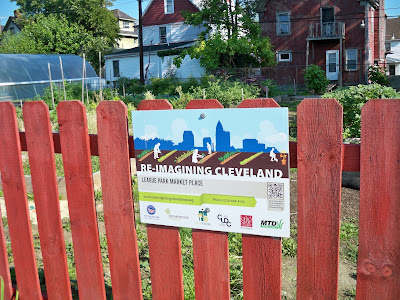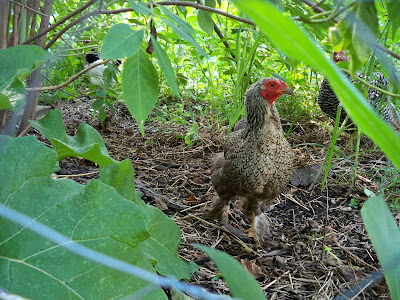Some of you may know that The College of
Wooster has a Senior Independent Study (IS), the equivalent of a senior
thesis. I have been working on my IS
since the start of my junior year and am almost done. I have completed my written thesis and passed
my orals, so what is left is my Symposium presentation. Some people have been interested to know what
I studied, so here is a bit more information.
What is really interesting about Cleveland is that unlike many cities, it has urban agriculture zoning laws and a relatively supportive city government. (Maybe it is because they have 20,000 vacant lots which is expensive to maintain.) The city has partnered with local community development organizations and other governmental agencies to fund start-up greening projects, many of which are urban gardens and farms. Many of the projects in my study were funded through ReImagining Cleveland, one such funding source.
I used a sustainable development framework which I developed using a combination of scholars from many disciplines to evaluate urban agriculture in Cleveland. The point was to create a framework that not just included environmental goals but also justice and grassroots procedures. I wanted to develop this framework because I found all of these components to be important to the gardeners and farmers I interviewed in my study. Issues of food justice, race, and inclusive neighborhood development were especially prominent.
Wooster’s Senior IS Symposium
A bit about my IS
I wanted to study urban agriculture in
Cleveland, Ohio after working there for a summer with a large educational urban
farm program. I really loved the work,
but was intrigued by a number of things I saw while working. I wanted to see the scope and depth of efforts
to grow food in the city, and I wanted to see what goals it was achieving.
 |
| An urban farm I helped build in 2010 |
 |
| Growing greens in a high tunnel at Buckeye in July 2012 |
What is really interesting about Cleveland is that unlike many cities, it has urban agriculture zoning laws and a relatively supportive city government. (Maybe it is because they have 20,000 vacant lots which is expensive to maintain.) The city has partnered with local community development organizations and other governmental agencies to fund start-up greening projects, many of which are urban gardens and farms. Many of the projects in my study were funded through ReImagining Cleveland, one such funding source.
 |
| These signs denote projects funded by ReImagining Cleveland |
I used a sustainable development framework which I developed using a combination of scholars from many disciplines to evaluate urban agriculture in Cleveland. The point was to create a framework that not just included environmental goals but also justice and grassroots procedures. I wanted to develop this framework because I found all of these components to be important to the gardeners and farmers I interviewed in my study. Issues of food justice, race, and inclusive neighborhood development were especially prominent.
I would really like to thank all of the
people who participated in my study. I
was able to do 21 really neat interviews of people who are running urban
agriculture projects throughout the city.
These individuals are of all ages and all walks of life, and are
involved in a wide variety of projects: community gardens, market farms, school
gardens, orchards, vineyards, permaculture, and more! The interview component was my favorite part
of my thesis, and it makes me think about doing more formal oral history
projects in the future.
 |
| Kale in Ohio City |
 |
| Chickens and permaculture in Ohio City |
A field trip to Rid-All
Separate from my IS requirements, as
part of my participation in a Food Systems course this semester, I was asked to
construct a short unit on food justice which included discussing urban
agriculture. It was a challenge to
figure out how to teach and talk about urban agriculture. (People often put it on a pedestal as the
silver bullet to any city’s ills; while I do think urban agriculture has many
wonderful benefits, I also do believe that it has drawbacks and that it not
always set up to benefit the community where it is located.) What I decided to do what have an in-class
component where we discussed urban agriculture, but then invite students to
visit some urban agriculture projects in Cleveland and see for themselves what
growing food in the city looks like.
One of the farms we visited on the field trip was Rid-All Green Partnership - a project that was not in my thesis but that I had been eager to visit for quite some time. Rid-All is Growing Power’s regional training center in Cleveland (see this post about my visit to Growing Power in Milwaukee). They run the same educational programming that Growing Power does to build community food systems in all types of contexts.
 |
| Rid-All's show greenhouse for aquaponics & vermicompost |
One of the farms we visited on the field trip was Rid-All Green Partnership - a project that was not in my thesis but that I had been eager to visit for quite some time. Rid-All is Growing Power’s regional training center in Cleveland (see this post about my visit to Growing Power in Milwaukee). They run the same educational programming that Growing Power does to build community food systems in all types of contexts.
 |
| Co-founder Damien Forshe shows us the aquaponics system |
 |
| Watercress uses & filters fish tank wastewater |
 |
| Tilapia live in fish tanks and use recycled water from watercress |
I was very impressed to see the amount
of work that the three Rid-All founders had done in such a short amount of
time: their first greenhouse went up just over two years ago and they now have
half a dozen of them. Not only are they
growing produce and fish for a wide range of people in the city, they are
building the foundations for other people to grow their own food by serving as
an educational organization. Their
combination of business practices and mission of food, social, and economic
justice gave me hope that urban agriculture can be a form of sustainable
development.
 |
| Early spring greens in the greenhouse |
 |
| Co-founder Keymah Durden explains greenhouse production |
Wooster’s Senior IS Symposium
If you’re in Wooster, you can come learn
more about my IS research at our Symposium on Friday April 26th at 9:30am in Lean Lecture Hall. More details and a program (with all student
presentations listed) can be found here.



